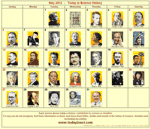Today In Science History ®
 �
�
The people and events of today
Click image background or title to go to Today's page.
Click on an individual to go to that person's birth date.

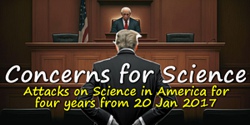
Concerns
for Science: Attacks
on Science in America for four years from 20 Jan 2017
On 20 Jan 2017, a new adminstration moved into the White House, which
immediately began attacking established science on climate change,
protection of the environment, reduced federal budgets for science, and
much more, by appointing unqualified individuals to several to key
scientific and environmental positions who lacked relevant expertise or
even were ideologically opposed to the mission of the agencies they
were tasked to lead. By 22 Apr 2017, in Washington, D.C., scientists
and concerned citizens took to the street to protest in the first March
For Science. In the space of the four years of this combative
administration there were so many attacks on science that it is worth a
memory refresher of what damage was done. Read Concerns for Science 2017 to review the long list
of negative actions.
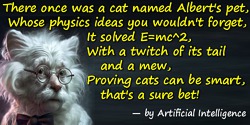
Other pages cover diverse topics that have caught your Webmaster's interest. Recent examples:
Education - Colin Powell - One Minute Read • Humane Leadership - Colin Powell - One Minute Read • Forerunner of Copernicus—Forgotten Nicole Oresme • The Myth of the Falling Apple • The First Oil Fountains of Pennsylvania • “The Logic of Elfland” by G.K. Chesterton • Professor Croftly’s Crime (1879) • What We Owe the Trees (1882) • The Indiana Pi Bill, 1897 • Animal Cruelty? No! Piccard “Defanged” a Rosebush, Not a Dog! (1933) • The Mystery of Srinivasa Ramanujan's Illness • The “Dancing” Statue Atop the Capitol Dome • The Origin of the Word Chemistry • Theodore Roosevelt - Naturalist • Helium Gas Well in Kansas • Origin of the Build a Better Mousetrap Quotation • The Truth About the Truth Serum • Tobacco and the Diseases it Produces - written in 1878 • The English Channel Telegraph Cable • The Origin of the Submarine • Franklin's Kite Experiment With Modern Apparatus • Muir of the Mountains • Jefferson as a Man of Science • Some Chemistry in the Science of Halloween Last Century • Did Shakespeare Anticipate Newton on Gravitation • How Was It Made a Century Ago - Money • Astronomic Grandeur • The History of the Propeller Beanie and the Ultimate Propeller-Head • Poets' and Novelists' Anticipations of Science • Who Invented the Sewing Machine? • Richard Feynman on the French Curve - A Reflection on “Thinking Inside the Box.” ...(more)
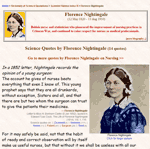
Richard Feynman: It is the facts that matter, not the proofs. Physics can progress without the proofs, but we can't go on without the facts ... if the facts are right, then the proofs are a matter of playing around with the algebra correctly. ...(more by Feynman)
Marie Curie • Winston Churchill • Galileo Galilei • Sigmund Freud • Robert Bunsen • Thomas Edison • Louis Pasteur • Theodore Roosevelt • Abraham Lincoln • Ronald Reagan • Leonardo DaVinci • Karl Popper • Johann Goethe • Benjamin Franklin • Robert Oppenheimer • Charles Kettering ... (more people)
Blood: Ancient stars in their death throes spat out atoms like iron which this universe had never known. ... Now the iron of old nova coughings vivifies the redness of our blood. — Howard Bloom ...(more on Blood)
Anatomy • Astronomy • Bacteria • Biochemistry • Botany • Conservation • Dinosaur • Environment • Fractal • Genetics • Geology • History of Science • Invention • Jupiter • Knowledge • Love • Mathematics • Measurement • Medicine • Natural Resource • Organic Chemistry • Physics • Physician • Quantum Theory • Research • Science and Art • Teacher • Technology • Universe • Volcano • Virus • Wind Power • Women Scientists • X-Rays • Youth • Zoology ... (more topics)
Weekly, from September 1942 to July 1945, Charles F. Kettering
(who invented the first automobile self-starter) gave five-minute
intermission talks about Science and Invention during the radio
broadcasts of the General Motors Symphony of the Air. These radio talks
are a fascinating legacy from the mind of a prolific inventor.
Research is a State of Mind • A Veterinarian “Shoes” a Horseless Carriage • Orukter Amphibolos • Lady of the Lamp • An Idea Explodes • R-A-D-A-R • A Man Who Groped in the Dark • Christmas Lecturer • The Crown Jewels • George Washington - Patriot, Statesman and Scientist • From Cocoon to Test Tube • Purple Dye, Sun Glasses and Malaria ... (more stories)
Henning Brand's “Philosopher's Stone”: There once lived in the
Middle Ages in the German town of Hamburg a merchant by the name of
Hennig Brand. We do not know how inventive he was in his trade
operations, but can assert confidently that he had only a very crude
idea of chemistry...
One fine evening the former merchant had a streak of luck. A substance, white as snow, settled at the bottom of his retort. It burned quickly, forming thick asphyxiating fumes. And the strangest thing was that it glowed in the dark. The cold light it gave off was so bright that Brand could read his ancient alchemical treatises by it (for him these treatises had now taken the place of business letters and receipts). (complete story)
How the Inert Gases Stopped Being Inert • The Icicle's Secrets • Mortality and Immortality in the World of Elements • On the Track of False Suns • Little Stories from Archeology • A Hymn to Modern Alchemists • Element Register • Lightning and Tortoises • How to Make a Tortoise Go Like "Lightning" and Vice Versa • How Chemistry Made Friends with Electricity • Enemy Number One... • ...And How to Fight It • A Luminous Jet • The Sun as Chemist ... (more stories)
Introduction: The history of the search for perpetual motion
does not afford a single instance of ascertained success; all that
wears any appearance of probability remains secret, and like other
secrets, can not be defended in any satisfactory way against the
opinions of the skeptical, who have in their favor, in this instance,
an appeal to learned authorities against the principle of all such
machines, and the total want of operativeness in all known practical
results. Published statements afford sorry examples of talents and
ingenuity strangely misapplied. Some, but very few, are slightly
redeemed from contempt by a glimpse of novelty. Of genius all are
deficient, and the reproductions of known fallacies show a remarkable
ignorance of first principles on one side and of the most ordinary
sources of information on the other. ... (more)
In the margin of most pages, there is a multiple-choice quiz. Each page
has a question served randomly from the database. Although there are
some easy questions, others are designed to be challenging — to make
you think. If you pick the right answer, congratulations. Three times
in a row you can be very proud. Some questions should leave you feeling
you found out something you hadn't thought about very much before.
Enjoy!
... (quiz on this page)
Sign up for the email newsletter, and you will receive a daily dose of
the science events and people for that day. Each newsletter may include
a description and link to a feature article, some quotations from the
scientists born or died on the day, and some quiz questions. Some days
the scientist names or events are very familiar, and the questions are
easier. Other days, the questions should raise your interest in
knowing about the lesser known scientists. There is a link to instant
answers online, or they also come in the next day's newsletter.
... (sign
up)
You can print out a calendar page for each month of the year which has
a thumbnail picture related to a science anniversary on each day.
Usually it will be on
the person's birth day, some are on the date of death, and a few are
for an event.
... (more)
 �
� The people and events of today
Click image background or title to go to Today's page.
Click on an individual to go to that person's birth date.
�
Image used with permission from
Nov 1999 American Heritage magazine.
Nov 1999 American Heritage magazine.
What's New - Recently added pages

David Attenborough: The Last Wave
To recognize the 97th birthday (8 May 2023) of acclaimed natural history presenter David Attenborough, a webpage has been added about “The Last Wave” of the Panamanian Golden Frog. It is a brief excerpt, a real-life story, from his book, Life on Air: Memoirs of a Broadcaster. Attenborough tells how, knowing that this interesting amphibian was on the brink of extinction in the wild, a particular effort was made to film the animal in its natural habitat before it no longer existed there. He explains the reason for the decline of the species, and how several zoos have joined in a breeding program to keep the species in existence, protected from harm. The frog is interesting to look at, and the article is an interesting short read.
Concerns
for Science: Attacks
on Science in America for four years from 20 Jan 2017
On 20 Jan 2017, a new adminstration moved into the White House, which
immediately began attacking established science on climate change,
protection of the environment, reduced federal budgets for science, and
much more, by appointing unqualified individuals to several to key
scientific and environmental positions who lacked relevant expertise or
even were ideologically opposed to the mission of the agencies they
were tasked to lead. By 22 Apr 2017, in Washington, D.C., scientists
and concerned citizens took to the street to protest in the first March
For Science. In the space of the four years of this combative
administration there were so many attacks on science that it is worth a
memory refresher of what damage was done. Read Concerns for Science 2017 to review the long list
of negative actions.

Artificial Intelligence: Artificial Intelligence: Albert's Pet
A new quotation page features the astonishing ability of Artificial Intelligence to provide original art and an original limerick. The first created was for “Albert’s Pet”. Also read a limerick about Isaac Newton’s inspiration about his law of gravity, and another about reactions to Einstein’s E=mc². More will be added later. Visit the Artificial Intelligence Quotes page to view a larger image of “Albert’s Pet” and more original illustrations made with the help of Artificial Intelligence.Other pages cover diverse topics that have caught your Webmaster's interest. Recent examples:
Education - Colin Powell - One Minute Read • Humane Leadership - Colin Powell - One Minute Read • Forerunner of Copernicus—Forgotten Nicole Oresme • The Myth of the Falling Apple • The First Oil Fountains of Pennsylvania • “The Logic of Elfland” by G.K. Chesterton • Professor Croftly’s Crime (1879) • What We Owe the Trees (1882) • The Indiana Pi Bill, 1897 • Animal Cruelty? No! Piccard “Defanged” a Rosebush, Not a Dog! (1933) • The Mystery of Srinivasa Ramanujan's Illness • The “Dancing” Statue Atop the Capitol Dome • The Origin of the Word Chemistry • Theodore Roosevelt - Naturalist • Helium Gas Well in Kansas • Origin of the Build a Better Mousetrap Quotation • The Truth About the Truth Serum • Tobacco and the Diseases it Produces - written in 1878 • The English Channel Telegraph Cable • The Origin of the Submarine • Franklin's Kite Experiment With Modern Apparatus • Muir of the Mountains • Jefferson as a Man of Science • Some Chemistry in the Science of Halloween Last Century • Did Shakespeare Anticipate Newton on Gravitation • How Was It Made a Century Ago - Money • Astronomic Grandeur • The History of the Propeller Beanie and the Ultimate Propeller-Head • Poets' and Novelists' Anticipations of Science • Who Invented the Sewing Machine? • Richard Feynman on the French Curve - A Reflection on “Thinking Inside the Box.” ...(more)

Science Quotes Index by Scientist Name
Albert Einstein: I used to wonder how it comes about that the electron is negative. Negative-positive—these are perfectly symmetric in physics. There is no reason whatever to prefer one to the other. Then why is the electron negative? I thought about this for a long time and at last all I could think was “It won the fight!” ...(more by Einstein)Richard Feynman: It is the facts that matter, not the proofs. Physics can progress without the proofs, but we can't go on without the facts ... if the facts are right, then the proofs are a matter of playing around with the algebra correctly. ...(more by Feynman)
Marie Curie • Winston Churchill • Galileo Galilei • Sigmund Freud • Robert Bunsen • Thomas Edison • Louis Pasteur • Theodore Roosevelt • Abraham Lincoln • Ronald Reagan • Leonardo DaVinci • Karl Popper • Johann Goethe • Benjamin Franklin • Robert Oppenheimer • Charles Kettering ... (more people)
Science Quotes Index by Topic
Atomic Bomb: I have always fancied that the end of the world will be when some enormous boiler, heated to three thousand millions of atmospheric pressure, shall explode and blow up the globe. ... They [the Americans] are great boilermakers. — Jules Verne (1863). ...(more on Atomic Bomb)Blood: Ancient stars in their death throes spat out atoms like iron which this universe had never known. ... Now the iron of old nova coughings vivifies the redness of our blood. — Howard Bloom ...(more on Blood)
Anatomy • Astronomy • Bacteria • Biochemistry • Botany • Conservation • Dinosaur • Environment • Fractal • Genetics • Geology • History of Science • Invention • Jupiter • Knowledge • Love • Mathematics • Measurement • Medicine • Natural Resource • Organic Chemistry • Physics • Physician • Quantum Theory • Research • Science and Art • Teacher • Technology • Universe • Volcano • Virus • Wind Power • Women Scientists • X-Rays • Youth • Zoology ... (more topics)
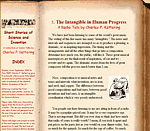 Short Stories of
Science and Invention
Short Stories of
Science and Invention
Weekly, from September 1942 to July 1945, Charles F. Kettering
(who invented the first automobile self-starter) gave five-minute
intermission talks about Science and Invention during the radio
broadcasts of the General Motors Symphony of the Air. These radio talks
are a fascinating legacy from the mind of a prolific inventor.Research is a State of Mind • A Veterinarian “Shoes” a Horseless Carriage • Orukter Amphibolos • Lady of the Lamp • An Idea Explodes • R-A-D-A-R • A Man Who Groped in the Dark • Christmas Lecturer • The Crown Jewels • George Washington - Patriot, Statesman and Scientist • From Cocoon to Test Tube • Purple Dye, Sun Glasses and Malaria ... (more stories)
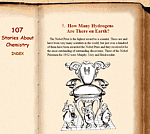 Stories
About Chemistry
Stories
About Chemistry
Henning Brand's “Philosopher's Stone”: There once lived in the
Middle Ages in the German town of Hamburg a merchant by the name of
Hennig Brand. We do not know how inventive he was in his trade
operations, but can assert confidently that he had only a very crude
idea of chemistry...One fine evening the former merchant had a streak of luck. A substance, white as snow, settled at the bottom of his retort. It burned quickly, forming thick asphyxiating fumes. And the strangest thing was that it glowed in the dark. The cold light it gave off was so bright that Brand could read his ancient alchemical treatises by it (for him these treatises had now taken the place of business letters and receipts). (complete story)
How the Inert Gases Stopped Being Inert • The Icicle's Secrets • Mortality and Immortality in the World of Elements • On the Track of False Suns • Little Stories from Archeology • A Hymn to Modern Alchemists • Element Register • Lightning and Tortoises • How to Make a Tortoise Go Like "Lightning" and Vice Versa • How Chemistry Made Friends with Electricity • Enemy Number One... • ...And How to Fight It • A Luminous Jet • The Sun as Chemist ... (more stories)
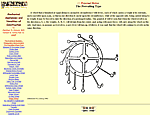 Perpetual Motion
Perpetual Motion



